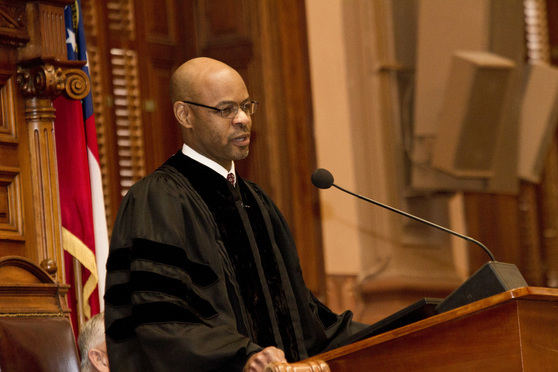Georgia Supreme Court Chief Justice Harold D. Melton extended the statewide judicial emergency Monday.
The new order runs until May 13, extending by a month the one Melton signed on March 14, which was due to expire April 13. Both orders close the courts to all but essential functions in order to control the spread of COVID-19. At the same time, the courts are ordered to remain open to deal with matters that are critical or “essential” to protect the “health, safety, and liberty of individuals.”
Issuing search and arrest warrants and the granting of domestic abuse restraining orders have been identified as essential functions, as have granting bonds. Criminal trials and jury duty have been suspended statewide. Melton is urging judges to use teleconferencing and videoconferencing where feasible when conducting hearings or other court matters to avoid litigants, judges, and others from having to convene in the courthouse and risk exposure to COVID-19.
As of Monday, the Georgia Department of Community Health COVID-19 daily status report showed 7,314 cases, 1,332 people hospitalized and 229 deaths.
Melton also urged judges to use creative means to avoid backlogs in nonessential matters where they can do so safely.
“With regard to matters not deemed essential functions under the Statewide Judicial Emergency Order, courts and litigants are encouraged to proceed to the extent feasible and consistent with public health guidance, for example, through the use of teleconferences and videoconferences, to reduce backlogs when the judicial emergency ends,” the order said.
“The threat of this virus is difficult for everyone,” Melton said in a news release. “Court personnel are no exception. We have to ensure that they can safely fulfill their mission.”
Melton said mandating that only essential matters be addressed by the courts is a step toward protecting the safety of court personnel and the public. But he added, “I also want to encourage courts and counsel in nonessential matters to move those matters forward as much as possible and practicable to maintain the flow. We should do what we can safely do during this time to keep the courts’ backlog from growing too large.”
The order also urged attorneys to remember their “obligations of professionalism.” Melton cited the Lawyer’s Creed and Aspirational Statement on Professionalism. In particular, Melton urged attorneys to accommodate opposing counsel in either moving cases along or agreeing to continuances as appropriate during the emergency.
Melton said he will give notice of the expected termination of the order “at least one week in advance to allow courts to plan the transition to fuller operations.”
On April 1, Gov. Brian Kemp announced a statewide shelter-in-place order. The following day, Department of Public Health Commissioner Kathleen E. Toomey issued a clarification.
“It is important to emphasize why these measures are needed now to keep all Georgians healthy and safe and to stop the spread of COVID-19,” Toomey said in a news release. “For weeks it has been known that people who were positive for COVID-19 but did not have symptoms likely were able to transmit the virus. However, on March 30, Centers for Disease Control and Prevention (CDC) Director Robert Redfield, M.D., confirmed that new data indicates that as many as 25% of individuals infected with COVID-19 remain asymptomatic. Additionally, science also now informs us that individuals who are symptomatic, are infectious up to 48 hours before symptoms appear. This new information tells the health care community, medical researchers, public health and governments why COVID-19 is spreading so rapidly.”
The scientific expert guidance had shifted gears, she said.
“Until now, containing the spread of COVID-19 has been based on early detection and isolation of people with symptoms of the virus,” said Toomey. “Social distancing and keeping people apart from each other are now more than just recommendations; they are the best weapons we have to stop the spread of COVID-19.”
Toomey took the opportunity to add more recommendations that can’t be repeated too often.
“In addition to social distancing, all Georgians are reminded to wash their hands frequently and thoroughly with soap and water, or use an alcohol-based hand sanitizer (60% alcohol) when soap and water aren’t available. Avoid touching your face, nose, mouth and eyes with unwashed hands. Cover your coughs and sneezes with a tissue and throw the used tissue in the trash,” she said. Forget the earlier advice from other experts to cough into an elbow. Clothing can carry the virus around and spread it.
NOT FOR REPRINT
© 2024 ALM Global, LLC, All Rights Reserved. Request academic re-use from www.copyright.com. All other uses, submit a request to [email protected]. For more information visit Asset & Logo Licensing.


 Chief Justice Harold Melton, Supreme Court of Georgia. (Photo: John Disney/ALM)
Chief Justice Harold Melton, Supreme Court of Georgia. (Photo: John Disney/ALM)





